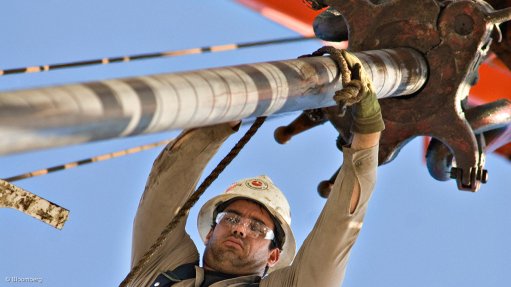
Photo by: Bloomberg
Should South Africa fail to accelerate its shale gas ambitions, it could miss out on the largest opportunity it would see for the next three decades, Shell Marketing South Africa and Shell South Africa Holdings chairperson Bonang Mohale said on Thursday.
With the world’s population increasing to nine-billion and the number of vehicles expected to rise from 800-million to two-billion by 2050, conventional energy would not be able to keep up with demand and cleaner, unconventional alternatives would have to be reassessed to reduce environmental impact.
Further, South Africa needed 40 GW of additional new energy capacity by 2030, particularly as its own population, access to electricity and demand grows.
Given the current economic potential of shale gas development in the Karoo, which was said to have more than 300-trillion cubic feet (tcf) of gas, and a stable, more energy efficient alternative to coal-generated energy, it “made sense” to examine South Africa’s own shale gas potential, he argued.
“In the next 30 years, we will not have a bigger opportunity than [that which is] confronting us [now] with [the potential development of] shale gas,” stated Mohale during the Gas Week conference, in Bryanston, adding that the country missed the “commodity boom” and could miss the “gas boom”.
“We have been talking about it since 2008 … and now, in 2014, we are still talking about it,” he commented.
There was an “amazing opportunity” to develop this resource responsibly, while creating a brand new industry, alleviating poverty, creating hundreds of thousands of jobs and developing peripheral industries, while growing South Africa’s gross domestic product (GDP).
South Africa was lagging other African countries in economic growth and needed to jump to a 6% a year growth rate to absorb, besides others, the 150 000 incoming graduates into the working world and ensure sustainability.
Mohale said that, during the exploration phase, Shell would inject $200-million in a project that could create between 300 000 and 700 000 full-time jobs across the value chain.
Shell, which hopes to engage the new Environmental Affairs and Mineral Resources Ministers soon in an effort to fast-track its application for an exploration licence, would then boost its investment by billions of dollars during the production phase.
A study commissioned by Shell determined that even with only 20 tcf of gas, the resource could have an economic impact of R80-billion, inject an additional R35-billion into the fiscus, and contribute 3.3% to GDP growth.
A 50 tcf resource would see an economic impact of more than R200-billion, while adding R90-billion to the fiscus and contribute 9.6% to GDP growth.
Shell would embark on a full environmental-, social- and health-impact assessment and drill between 6 and 24 wells over three years, should it secure a licence to explore for shale gas in the Karoo.